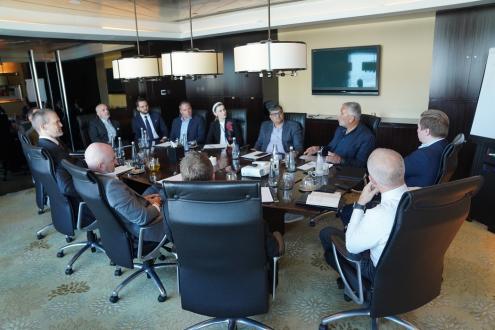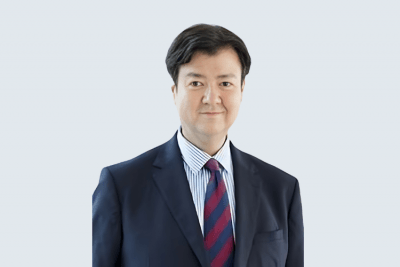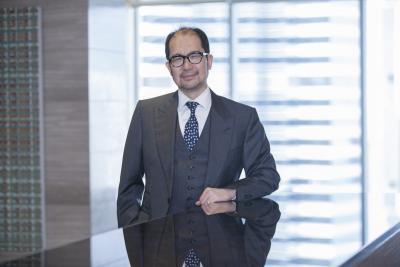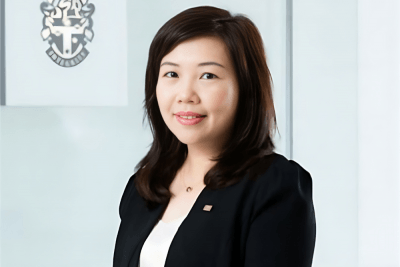Wealth Solutions & Wealth Planning
Wealth & Family Business Transition and Succession in the Middle East – a Hubbis Round Table Discussion
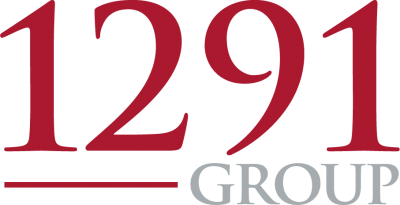
May 29, 2023
Hubbis hosted a round table discussion in Dubai in May, kindly supported by 1291 Group, which focused on business families in transition and the appeals of launching a family office in the UAE, analysing some of the key motivations and the important elements to consider in the transfer of wealth and control in businesses, and the formation and then operation of family office entities.
1291 was represented by Marc-Andre Sola, Founder & Chairman of 1291 Group, who in 2022 moved himself and his family to Dubai, and who sees the UAE and broader region as a significant source of new business in the coming years.
For more information and a deeper understanding of the firm and its presence in the region, see this article on 1291: https://hubbis.com/article/1291-chairman-marc-andre-sola-highlights-the-huge-growth-potential-in-the-middle-east-and-africa
The off-the-record discussion was designed to drive debate and create open, frank, and insightful conversations among the experts represented, which included leaders from private banks, banks in the region, EAMs and MFOs, Trustees, Life Insurers, Consultants and even SFOs. This is a summary of some of the selected comments and views.
These are some of the topics they discussed:
- How can family businesses and family wealth survive to future generations?
- Are families in the region adequately prepared for the transition to the next generation?
- What steps have been taken (if any) to prepare the next generations?
- Are those next generations either capable or motivated, and what are the alternatives?
- How do clients deal with children and grandchildren that are either not competent, or who are disinterested?
- What structures are viable and advisable for these types of families. Onshore or offshore trusts?
- What about family and business governance, constitutions, charters, shareholder agreements and other methods of helping to steer these ships?
- What does the family office do for those families wanting to continue their businesses, or divest and convert to more diversified investments?
Key Findings & Observations in Detail
A leading consultant in a global firm operating in the region first explained that in his experience, most wealthy families do not involve their bankers in their succession plans, preferring to leave the banks to help them manage their investments.
Another expert went further, remarking that the founders, usually patriarchs, very often prefer not to discuss these issues at all, unless there are major trigger events that compel them to do so. And she explained that the younger generations in the region shy away from expressing their own preferences, especially if they have little or no interest in running the businesses in the future and want to do other things.
A private banker agreed that there is a reluctance to discuss these matters openly, and reported that at their regular nextgen events they find many younger generations who want to steer clear of the family businesses, but that a way to draw them into the fold is sometimes to pass them a small or new business to run, just to get them connected and engaged.
“All the surveys we are involved in or see highlight this lack of communication and openness, and this is especially true in this region,” said another expert. He suggested that the global pandemic had driven more transparency in these matters, but not enough. “There is more head-on and critical questioning taking place between the generations in the last few years, and a greater effort around making sure these are positive discussions, not designed in any way to offend. The younger generations often remark that they would be ok to run these family businesses, but in their way, not necessarily as before. Some of the founders understand this, that the nextgens want to manage on their own terms, including with more technology support, for example.”
Another guest observed that there is progress- she highlighted how by gentle advice and nurturing, patriarchs are gradually warming to the concept of involving the nextgens in their thinking and decisions. “There is more buy-in than before,” she reported, “and that is from both the founders and the younger generations, but it does take time.”
A banker warned of the high-profile troubles that can sometimes follow if family businesses that are important to local economies face succession problems and conflict.
A guest pointed to some research they had conducted that showed 60% of people don't even want to talk about these issues within the family, and the other 20% talk about it only when it's urgent. He said 40% of replies they received said they had a form of succession plan, while 12% had no intention of doing any succession planning.
Another viewpoint came from a banker who said some of the ‘younger’ entrepreneurs side-step these business succession issues by divesting their businesses, going to cash and other investments instead, so that the nextgens can embark on their own courses.
Others prefer to bring in external professional management and split the ownership of the businesses equitably amongst the family’s different generations. Some prefer to introduce structures such as the family office, or other structures that help both with control and oversight of all investments, and with future succession.
A guest added that the family constitution and then a family council can be layered on top, but again, patriarchs within the region are often slow to embrace such ideas and practices.
“The whole idea of business transition, family constitutions, family governance, estate planning and so forth are very Western ideas, that work well with old European money, but less so in markets like this and where there is no inheritance tax either. Taxation is a major driver and issue from very early on in the West, but less so here or in Africa, or even much of Asia.”
An expert highlighted the even more pressing need for such governance, constitutions and planning for those families whose nextgens are not keen on taking up the reins of the family enterprises in the future.
“If the natural heirs are not capable, or those heirs are not prepared, then it puts even more responsibility on the patriarch or wealth owners to do something, to build a succession planning strategy and then to implement it successfully,” he advised. “There are plenty of tools available in most jurisdictions to protect your assets even when you split beneficial entitlements from control, so you can create a bespoke governance mechanism, which may not involve family members if they are not capable or not ready.£
He added that a family office structure is helpful for those who want to divest their family businesses and reinvest in all types of other investments around the world. He said it is a lot easier to transition a family office, as it can be easily professionally managed, either entirely, or partially alongside family members, who require less specialist skills than managing businesses. “Family offices need the right professionals and the right technologies to manage effectively,” he explained.
Another guest pointed to the increasing strengths and appeals of the UAE for such family offices, not only for local or regional Middle East families but for very wealthy families from across the globe.
Managing money for many of the founders can be more stressful and problematic than managing the businesses they created
There then followed some discussion around the family businesses and how their founders, once they come to sell, often find themselves at a loss and struggling to manage what can sometimes be hundreds of millions of money. “They created their businesses, and their identities are inextricably involved in those, and then they often struggle with all the complexities of trying to handle large sums of money and diverse investments,” a guest reported.
He said that is where a family office that is at least partly or perhaps wholly professionally managed can be a great solution on many levels. “Why would an amateur who had all his expertise in running his business suddenly become an expert in managing money?” a panel member pondered. “They are not and they are often completely lost.”
He said the reality is that the markets are not the same today, noting that you can't look at the future by looking at the rear-view mirror. He remarked that everything seems to be changing very rapidly, whether it is equities, bonds and rates, real estate, digital assets and so forth.
The UAE’s overall wealth management and advisory proposition is improving and evolving remarkably fast but it will take time to become tried and tested
Another expert noted that the UAE’s wealth management offerings, its regulations, its depth of professional and fiduciary services and its overall stability and diversity are all heading in the right direction for family advisory, However, it is a tougher sell as the history is not yet there, and the developments are relatively recent – for example, the arrival of foundations in the DIFC.
“We are moving in the right direction, and maybe in 10 years it will be more tried and tested, but a lot of what is on offer is new or quite recent,” another expert commented. “The pace of change is impressive, the ecosystem is being created, but it will take time to prove the structures, the legal systems and processes, and so forth.”
The guests agreed that even for very wealthy families in the region, for example in Saudi Arabia, the structures, trusts, foundations, legal systems and protocols, taxation and other issues will all need to become more proven. HE predicted thata as this happens, confidence in the region’s offerings will rise and more and more of the region’s wealthy will consider shifting from their established offshore jurisdictions – such as Liechtenstein, Jersey, the Caymans and others – and trying out the UAE for some structures.
And there appeared to be a consensus that more and more global money – for example from China – could pour into the region in coming years, as the UAE becomes more of a mainstream wealth, advisory and professional services hub, assuming the governments continue their policies of opening the door to residence in the region, thereby offering families a longer-term horizon and stability. Moreover, the geopolitical neutrality of the region is increasingly appealing to many people around the world.
“The positioning of the UAE is very smart indeed,” came one voice. “The region is increasingly open-minded, and the authorities know there's so much desert to fill, and we have to attract so many people, hence residence and even citizenship are on the table now. China offers massive potential for this region in terms of private wealth moving here, bringing family offices as well.”
He said Hong Kong is now considered part of China, so is far less appealing for the Mainland Chinese seeking offshore structures, and while Singapore has been the major beneficiary, some of those Chinese families are looking elsewhere.
Tempering this view somewhat, another guest said the China wave was not yet happening, but that there are many families and advisors looking at the DIFC and ADGM offerings, infrastructure and ecosystems. “This is the information gathering stage right now,” he said, “and is sending a very strong signal that at some point, at least some of them are going to move here.



